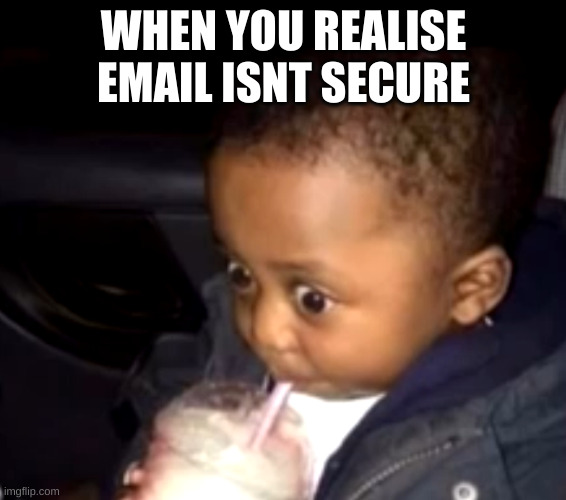They are no more safe than sending a message like this :). Except you would be the only person it’s targeted for. besides the admins of both instances can read them as well.
Which is why I’m the web interface it says it’s not safe/e2e encrypted.
Worried about it? Add a matrix handle to your profile and then it enables a “send a secure message” button in the UI. And redirects people to use matrix to send messages to you
Oh shit that matrix feature is real cool. Thanks for sharing.
besides the admins of both instances can read them as well.
What?
Wait until you hear about the people hosting your email

Haha, love the image. I think everyone feels that way the first time they learn it.
End to end encrypt emails whenever you can too. Now, getting those you communicate with to implement and utilize pgp? That’s a whole other battle.
Nothing on lemmy is private. Your instance is just hosted on a server, and in this instance that server is essentially just someone elses computer. Anything you do or say on the server can be viewed by the admin and whoever they decide to delegate access to.
This is true for practically every online service ever.
This is true for practically every online service ever.
Sorry i have to correct this statement. Unless all encryption can be broken one day (which is a different discussion), end-to-end encryption can be seen as private … if both parties can trust each other to keep it so.
One can see if a service/app does e2ee if they (best) ask you to enter your public key (and only that) which will be shared to others to enable them to encrypt messages to you (such PMs can only get decrypted with your private key which is stored nowhere but on your own devices), and verify signatures done using your privkey. In the second-best case, an application will generate a key pair on your device and instruct you to store away the private key it just generated somewhere safe and protected by a long passphrase because if you lose it your PMs can not be recovered.Interestingly, the ActivityPub protocol and IIRC also the Lemmy database have a “public key” field which could be used for e2ee purposes but the functionality is just not implemented.
the admin of your Instance has full access to your account as they have full access to the database that holds your dms
Yeah, really it would be surprising to me if this wasn’t the case.
Oh ok, thanks!
I didn’t know about the matrix feature, thank you!
Didn’t know about the Matrix integration. Thanks!
DMs are basically comments without a post and only one regular user can see it. No encryption, and it can be viewed by admins. (Private message reporting is a thing)
DMs on the fediverse (and Lemmy) are posts with a specific visibility that marks them as DMs. They are sent like any other posts, so there’s no encryption and instance admins could in theory read them in the database.
Not in theory, in practice, but this is not high need feature.
If you need to keep your sexting private, use another platform. If you have a exhibition fetish, go ahead.
As a coder I can say that e2e encryption is pain in the ass, key generation and exchanging, complex and annoying to do.
e2e encryption is pain in the ass, key generation and exchanging, complex and annoying to do
No, no it’s not.
Yes, it’s more complex than sending plaintext. But for starters it’d be extremely simple to generate a keypair for every user and publish the public key with their profile. When sending DMs you’d use this public key to encrypt the message.
As for storing the private key you could encrypt it with (a derivative of) the user’s password, and store it decrypted possibly just in the user’s browser.
This simple measure would prevent simple ways of reading the DMs, though obviously you still need to trust that your instance admins are actually serving you the code they claim they do. But it’d definitely prevent “accidental” misuse.
As for storing the private key you could encrypt it with (a derivative of) the user’s password
And now every time a user forgets their password and does password recovery, they lose all their DMs.
E2EE chat is a difficult problem.
That’s a feature not a bug!
Actually, users should not be required to trust the browser storage or in-app key generation, but be enabled to enter their own pgp key.I mean you could just store it encrypted in the database for the basics, and for advanced users allow them to back it up.
There are tons of ways to improve it, but there is definitely way more you can do without much inconvenience to the users. I doubt losing old DMs is a huge issue when you forget your password…
Fediverse adds level of complexity on it, like you mention.
Malicious Lemmy instance could man-in-the-middle by providing it’s public key in behalf of the user in other side. Normally this can be mitigated by CA, but CA doesn’t fit very well in decentralized system.
You could add AES with users own password, but problem is that same malicious instance could also steal users password.
IMHO false sense of privacy is worst than knowing that stuff is unsecure. Again in my opinion fediverse is comparable to yelling in town square.
- It is not unsafe.
- It is not 100% private. Admins can read your messages if they choose to investigate your messages.
- It will not get blasted out to the whole fediverse; just to the recipient you indicated. (Unless an admin from the previous point reads your message and publishes it publicly on the fediverse)
- You do not get to do anything naughty with it; expect to be caught if you break the rules.
Anyone remember the days when they were called PMs? They are least used the word Private in the acronym.
Yes, and when we used the term “programs” instead of “apps” for everything.
Let’s go even farther back and say they were all “applications”
What does DM even mean?
Direct Message. As opposed to Private Message.
Services at least acknowledge that the messages aren’t private, which is an improvement I guess.
Not safe at all because it was not designed to be, it even tells you as much. Use them to exchange e2ee contacts and then use that.
@HiddenLayer5 @Kidplayer_666 U can use it to privately talk as much as ur comfortable with it going public.










